#API Security Market Growth
Explore tagged Tumblr posts
Text
API Security Market - Forecast (2024-2030)
API Security Market Overview:
API Security Market size is estimated to reach $6.3 billion by 2030, growing at a CAGR of 25.4% during the forecast period 2023-2030. Increasing adoption of APIs to leverage cloud-based services and build digital ecosystems is driving the demand for API security solutions among organizations. This trend is expected to boost the growth of the API Security Market during the forecast period.
Additionally, the rising number of cybersecurity threats is compelling organizations to adopt API security solutions. APIs are a common target for attackers willing to disrupt services or steal data. As per recent studies, it was estimated that US-based companies have lost somewhere between $12 billion and $23 billion in 2022 alone from API data breaches. Organizations are investing in API security solutions to mitigate these risks and ensure the security of their sensitive data. These factors positively influence the API Security industry outlook during the forecast period.
Request Sample
API Security Market - Report Coverage:
The “API Security Market Report - Forecast (2023-2030)” by IndustryARC, covers an in-depth analysis of the following segments in the API Security Market. Attribute Segment
By Deployment Type
On-premise
Cloud-based
By Solution
API Security Software
API Security Solution
By Organization Size
Small Enterprises
Medium Enterprises
Large Enterprises
By End Use Verticals
BFSI
IT & Telecom
Government
Healthcare and Life Sciences
Retail and E-commerce
Media & Entertainment
Travel & Hospitality
Education
Power & Utilities
Industrial
Others
By Geography
North America (U.S., Canada and Mexico)
Europe (Germany, France, UK, Italy, Spain, Russia and Rest of Europe),
Asia-Pacific (China, Japan, South Korea, India, Australia & New Zealand and Rest of Asia-Pacific),
South America (Brazil, Argentina, Chile, Colombia and Rest of South America)
Rest of the World (Middle East and Africa).
COVID-19 / Ukraine Crisis - Impact Analysis:
● The COVID-19 pandemic accelerated the adoption of digital technologies and cloud-based solutions, which has led to increased use of APIs by organizations. The raised concerns about security have boosted the demand for API security solutions. On the other hand, the pandemic has caused economic uncertainty, causing some organizations to cut back on IT spending, especially on investment in API security solutions. Also, the shift to remote work has made it difficult for the organizations to secure their APIs in this new environment.
● The conflict between Russia and Ukraine could lead to an increase in cyberattacks, including attacks on APIs. This would boost the demand for API security solutions as organizations look for ways to protect themselves from these threats. Also, the conflict is causing economic uncertainty in the region, which could impact the IT spending and investment in API security solutions. Additionally, the supply-chain disruptions caused by the conflict may impact the availability of IT resources, which could further impact the market.
Inquiry Before Buying
Key Takeaways:
● Fastest Growth of Asia-Pacific Region
Geographically, in the global API Security market share, Asia-Pacific is analyzed to grow with the highest CAGR of 25.9% during the forecast period 2023-2030. The increasing adoption of APIs and cloud-based solutions in the region along with the rising number of cyber threats and regulatory compliance requirements are boosting the growth of the region's API Security Market share. According to Imperva, a cybersecurity firm, APAC governments have taken a variety of approaches to open banking and the advent of open banking has brought about a transformative shift for both businesses and consumers. With the growing demand for these services, banks and fintech companies will increasingly depend on application programming interfaces (APIs).
● Cloud-based Segment to Register the Fastest Growth
In the API Security Market analysis, the cloud-based segment is estimated to grow with the fastest during the forecast period. There are several factors boosting the growth of this segment. Firstly, cloud-based API security solutions can easily scale up or down depending on the changing needs of the organization. It offers greater flexibility than on-premise solutions. Also, cloud-based solutions usually require lower upfront costs.
● BFSI Sector is the Fastest Growing Segment in the Market
According to the API Security Market forecast, the BFSI sector is estimated to register the fastest growth during the forecast period. The financing institutions are increasingly adoption APIs to enable new digital services, such as peer-to-peer payments and mobile banking. These services require strong API security to prevent fraud, protect customer data and comply with regulatory requirements.
According to the Salt Labs State API Security Report Q1 2022, API attack traffic has increased 681 percent in the past 12 months (of publishing the report). Since financial institutions and fintech firms hold tremendous amount of valuable data, they are the perfect target for such attackers.
● Increasing Adoption of APIs
APIs are increasingly becoming a crucial component for modern digital businesses. They allow organizations to share data and services quickly and easily between different systems and applications. However, APIs create new security risks, making API security solutions critical to protect against cyber threats while ensuring regulatory compliance. This is one of the major factors driving the growth of the API Security Market during the forecast period.
Schedule a Call
● Growth of Digital Transformation Initiatives
The growth of digital transformation initiatives is analyzed to witness significant growth during the forecast period 2023-2030 as organizations strive to remain competitive in the digital age and keep up with evolving technologies. Data and analytics will increasingly contribute to innovation, helping businesses derive insights and achieve desired outcomes As per IndustryARC’s findings, the global digital transformation market is projected to surpass $1.3trillion by 2027. The shift to software-as-a-service (SaaS) platforms is expected to dominate the digital transformation landscape, enabling easier collaboration, improved productivity, and organizational flexibility. These trends underscore the ongoing need for organizations to adapt, innovate, and leverage digital technologies to drive growth, meet evolving customer expectations, and address market dynamics. APIs can facilitate the integration of various digital tools and services, enabling organizations to effectively implement their digital transformation strategies and leverage the benefits of automation, data analytics, and SaaS platforms. By leveraging APIs, organizations can seamlessly connect different systems, access relevant data, and streamline processes, ultimately accelerating their digital transformation efforts and achieving desired outcomes. The growing adoption of APIs is further set to drive the API security market during the forecast period.
● API Security implementation challenges and risks to impede to market growth
Implementing API security can pose several challenges and risks that organizations need to address. APIs expose endpoints that handle object identifiers, increasing the attack surface and creating potential vulnerabilities for Object Level Access Control issues which can lead to unauthorized access and data exposure. Implementing authentication mechanisms incorrectly can compromise authentication tokens and allow attackers to assume other users' identities. Weak authentication methods or flawed implementation can lead to unauthorized access and compromised API security. Lack of or improper authorization validation at the object property level can lead to excessive data exposure or manipulation by unauthorized parties. APIs require resources such as network bandwidth, CPU, memory, and storage to fulfill requests. Without proper rate limiting and resource management, malicious actors can launch Denial of Service (DoS) attacks, exhausting resources and disrupting API availability. These technical challenges are set to hinder the API security market growth in the future.
Key Market Players:
Product/Service launches, approvals, patents and events, acquisitions, partnerships and collaborations are key strategies adopted by players in the API Security Market.
The top 10 companies in this industry are listed below:
1. Akamai Technologies (Prolexic, Kona Site Defender)
2. Amazon Web Services, Inc. (AWS Shield, AWS WAF)
3. Apigee Corp. (Apigee Edge, Apigee Sense)
4. Auth0® Inc. (Auth0 API Management, Auth0 WebAuthn Passwordless)
5. Axway Software SA (Axway API Gateway, Axway SecureTransport)
6. Barracuda Networks, Inc. (Barracuda CloudGen Firewall, Barracuda WAF-as-a-Service)
7. Computer Associates International, Inc. (CA API Gateway, CA Single Sign-On)
8. Checkmarx Ltd. (Checkmarx CxSAST, Checkmarx CxIAST)
9. Cisco Systems, Inc. (Cisco Umbrella, Cisco API Security)
10. Cloudflare, Inc. (Cloudflare API Shield, Cloudflare Access)
Buy Now
Scope of Report: Report MetricDetails
Base Year Considered
2022
Forecast Period
2023–2030
CAGR
25.4%
Market Size in 2030
$6.3 billion
Segments Covered
Deployment Type, Solution, Organization Size, End User Vertical and Region
Geographies Covered
North America (U.S., Canada and Mexico), Europe (Germany, France, UK, Italy, Spain, Russia and Rest of Europe), Asia-Pacific (China, Japan, South Korea, India, Australia, New Zealand and Rest of Asia-Pacific), South America (Brazil, Argentina, Chile, Colombia and Rest of South America), Rest of the World (Middle East and Africa).
Key Market Players
Akamai Technologies
Amazon Web Services, Inc. (AWS)
Apigee Corp. (Google Cloud)
Barracuda Networks, Inc.
Cisco Systems, Inc.
Cloudflare, Inc.
ForgeRock, Inc.
IBM Corp.
Imperva, Inc.
Rapid7, Inc.
Key Market Players
Akamai Technologies
Amazon Web Services, Inc. (AWS)
Apigee Corp. (Google Cloud)
Barracuda Networks, Inc.
Cisco Systems, Inc.
Cloudflare, Inc.
ForgeRock, Inc.
IBM Corp.
Imperva, Inc.
Rapid7, Inc.
#API Security Market Size#API Security Market Trends#API Security Market Growth#API Security Market Forecast#API Security Market Revenue#API Security Market Vendors#API Security Market Share#API Security Industry
0 notes
Text
Get Chatbot service for business with APIWAA
In today’s fast-paced digital world, businesses are constantly looking for innovative ways to connect with their customers more effectively and efficiently. One of the most powerful tools available to achieve this is the APIWAA. By integrating APIWAA into your business operations, you can enhance communication, improve customer service, and drive engagement to new heights.
What is APIWAA?
APIWAA is a powerful communication tool that allows businesses to integrate WhatsApp messaging into their existing systems and workflows. Unlike the standard WhatsApp Business app, the API is designed for medium to large businesses, offering scalability and a range of advanced features that streamline customer interactions. It provides a programmable interface that enables businesses to send and receive messages, automate responses, and manage communication at scale.
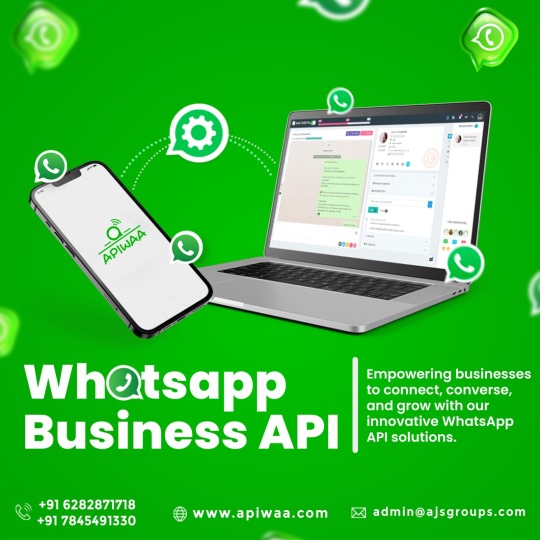
1.Enhanced Customer Communication: With APIWAA, businesses can offer real-time customer support and engagement. The ability to send instant replies to customer queries, provide order updates, and share promotional content ensures a smooth and efficient communication process. This level of responsiveness helps build trust and loyalty among customers.
2.Automation and scalability: The APIWAA allows for the automation of routine tasks, such as sending appointment reminders, order confirmations, and personalized messages based on customer interactions. This not only saves time but also ensures consistent and accurate communication. The API’s scalability means it can handle a large volume of messages simultaneously, making it ideal for businesses of all sizes.
3.Rich Media support: Unlike traditional SMS, APIWAA supports rich media messages, including images, videos, documents, and interactive buttons. This capability allows businesses to create engaging and visually appealing messages that can capture the attention of their audience more effectively.
4.Secure and Reliable: Security is a top priority for APIWAA. The platform uses end-to-end encryption to protect messages and data, ensuring that customer information remains private and secure. This level of security helps businesses comply with data protection regulations and provides peace of mind to both the business and its customers.
Use Cases: Customer Support: Provide instant responses to customer inquiries, resolve issues quickly, and offer support 24/7.
Marketing Campaigns: Send targeted promotions, offers, and updates directly to customers’ WhatsApp accounts, ensuring high open and engagement rates.
Order Notifications: Keep customers informed with real-time updates on order status, shipping details, and delivery confirmations.
Appointment Reminders: Automate appointment reminders to reduce no-shows and improve customer experience.
Conclusion: The APIWAA is a game-changer for businesses looking to enhance their communication strategy. By integrating this powerful tool, businesses can improve customer engagement, streamline operations, and ultimately drive growth. Whether you’re a small startup or a large enterprise, the APIWAA offers the flexibility and functionality needed to stay ahead in today’s competitive market. Embrace the future of communication with APIWAA and unlock your business’s full potential.
#whatsapp api#api#whatsapp marketing#apiwaa#whatsapp chatbot#healthcare chatbots market#whatsapp automation
3 notes
·
View notes
Text

Crypto Exchange API Integration: Simplifying and Enhancing Trading Efficiency
The cryptocurrency trading landscape is fast-paced, requiring seamless processes and real-time data access to ensure traders stay ahead of market movements. To meet these demands, Crypto Exchange APIs (Application Programming Interfaces) have emerged as indispensable tools for developers and businesses, streamlining trading processes and improving user experience.
APIs bridge the gap between users, trading platforms, and blockchain networks, enabling efficient operations like order execution, wallet integration, and market data retrieval. This blog dives into the importance of crypto exchange API integration, its benefits, and how businesses can leverage it to create feature-rich trading platforms.
What is a Crypto Exchange API?
A Crypto Exchange API is a software interface that enables seamless communication between cryptocurrency trading platforms and external applications. It provides developers with access to various functionalities, such as real-time price tracking, trade execution, and account management, allowing them to integrate these features into their platforms.
Types of Crypto Exchange APIs:
REST APIs: Used for simple, one-time data requests (e.g., fetching market data or placing a trade).
WebSocket APIs: Provide real-time data streaming for high-frequency trading and live updates.
FIX APIs (Financial Information Exchange): Designed for institutional-grade trading with high-speed data transfers.
Key Benefits of Crypto Exchange API Integration
1. Real-Time Market Data Access
APIs provide up-to-the-second updates on cryptocurrency prices, trading volumes, and order book depth, empowering traders to make informed decisions.
Use Case:
Developers can build dashboards that display live market trends and price movements.
2. Automated Trading
APIs enable algorithmic trading by allowing users to execute buy and sell orders based on predefined conditions.
Use Case:
A trading bot can automatically place orders when specific market criteria are met, eliminating the need for manual intervention.
3. Multi-Exchange Connectivity
Crypto APIs allow platforms to connect with multiple exchanges, aggregating liquidity and providing users with the best trading options.
Use Case:
Traders can access a broader range of cryptocurrencies and trading pairs without switching between platforms.
4. Enhanced User Experience
By integrating APIs, businesses can offer features like secure wallet connections, fast transaction processing, and detailed analytics, improving the overall user experience.
Use Case:
Users can track their portfolio performance in real-time and manage assets directly through the platform.
5. Increased Scalability
API integration allows trading platforms to handle a higher volume of users and transactions efficiently, ensuring smooth operations during peak trading hours.
Use Case:
Exchanges can scale seamlessly to accommodate growth in user demand.
Essential Features of Crypto Exchange API Integration
1. Trading Functionality
APIs must support core trading actions, such as placing market and limit orders, canceling trades, and retrieving order statuses.
2. Wallet Integration
Securely connect wallets for seamless deposits, withdrawals, and balance tracking.
3. Market Data Access
Provide real-time updates on cryptocurrency prices, trading volumes, and historical data for analysis.
4. Account Management
Allow users to manage their accounts, view transaction history, and set preferences through the API.
5. Security Features
Integrate encryption, two-factor authentication (2FA), and API keys to safeguard user data and funds.
Steps to Integrate Crypto Exchange APIs
1. Define Your Requirements
Determine the functionalities you need, such as trading, wallet integration, or market data retrieval.
2. Choose the Right API Provider
Select a provider that aligns with your platform’s requirements. Popular providers include:
Binance API: Known for real-time data and extensive trading options.
Coinbase API: Ideal for wallet integration and payment processing.
Kraken API: Offers advanced trading tools for institutional users.
3. Implement API Integration
Use REST APIs for basic functionalities like fetching market data.
Implement WebSocket APIs for real-time updates and faster trading processes.
4. Test and Optimize
Conduct thorough testing to ensure the API integration performs seamlessly under different scenarios, including high traffic.
5. Launch and Monitor
Deploy the integrated platform and monitor its performance to address any issues promptly.
Challenges in Crypto Exchange API Integration
1. Security Risks
APIs are vulnerable to breaches if not properly secured. Implement robust encryption, authentication, and monitoring tools to mitigate risks.
2. Latency Issues
High latency can disrupt real-time trading. Opt for APIs with low latency to ensure a smooth user experience.
3. Regulatory Compliance
Ensure the integration adheres to KYC (Know Your Customer) and AML (Anti-Money Laundering) regulations.
The Role of Crypto Exchange Platform Development Services
Partnering with a professional crypto exchange platform development service ensures your platform leverages the full potential of API integration.
What Development Services Offer:
Custom API Solutions: Tailored to your platform’s specific needs.
Enhanced Security: Implementing advanced security measures like API key management and encryption.
Real-Time Capabilities: Optimizing APIs for high-speed data transfers and trading.
Regulatory Compliance: Ensuring the platform meets global legal standards.
Scalability: Building infrastructure that grows with your user base and transaction volume.
Real-World Examples of Successful API Integration
1. Binance
Features: Offers REST and WebSocket APIs for real-time market data and trading.
Impact: Enables developers to build high-performance trading bots and analytics tools.
2. Coinbase
Features: Provides secure wallet management APIs and payment processing tools.
Impact: Streamlines crypto payments and wallet integration for businesses.
3. Kraken
Features: Advanced trading APIs for institutional and professional traders.
Impact: Supports multi-currency trading with low-latency data feeds.
Conclusion
Crypto exchange API integration is a game-changer for businesses looking to streamline trading processes and enhance user experience. From enabling real-time data access to automating trades and managing wallets, APIs unlock endless possibilities for innovation in cryptocurrency trading platforms.
By partnering with expert crypto exchange platform development services, you can ensure secure, scalable, and efficient API integration tailored to your platform’s needs. In the ever-evolving world of cryptocurrency, seamless API integration is not just an advantage—it’s a necessity for staying ahead of the competition.
Are you ready to take your crypto exchange platform to the next level?
#cryptocurrencyexchange#crypto exchange platform development company#crypto exchange development company#white label crypto exchange development#cryptocurrency exchange development service#cryptoexchange
2 notes
·
View notes
Text
Top 10 In- Demand Tech Jobs in 2025

Technology is growing faster than ever, and so is the need for skilled professionals in the field. From artificial intelligence to cloud computing, businesses are looking for experts who can keep up with the latest advancements. These tech jobs not only pay well but also offer great career growth and exciting challenges.
In this blog, we’ll look at the top 10 tech jobs that are in high demand today. Whether you’re starting your career or thinking of learning new skills, these jobs can help you plan a bright future in the tech world.
1. AI and Machine Learning Specialists
Artificial Intelligence (AI) and Machine Learning are changing the game by helping machines learn and improve on their own without needing step-by-step instructions. They’re being used in many areas, like chatbots, spotting fraud, and predicting trends.
Key Skills: Python, TensorFlow, PyTorch, data analysis, deep learning, and natural language processing (NLP).
Industries Hiring: Healthcare, finance, retail, and manufacturing.
Career Tip: Keep up with AI and machine learning by working on projects and getting an AI certification. Joining AI hackathons helps you learn and meet others in the field.
2. Data Scientists
Data scientists work with large sets of data to find patterns, trends, and useful insights that help businesses make smart decisions. They play a key role in everything from personalized marketing to predicting health outcomes.
Key Skills: Data visualization, statistical analysis, R, Python, SQL, and data mining.
Industries Hiring: E-commerce, telecommunications, and pharmaceuticals.
Career Tip: Work with real-world data and build a strong portfolio to showcase your skills. Earning certifications in data science tools can help you stand out.
3. Cloud Computing Engineers: These professionals create and manage cloud systems that allow businesses to store data and run apps without needing physical servers, making operations more efficient.
Key Skills: AWS, Azure, Google Cloud Platform (GCP), DevOps, and containerization (Docker, Kubernetes).
Industries Hiring: IT services, startups, and enterprises undergoing digital transformation.
Career Tip: Get certified in cloud platforms like AWS (e.g., AWS Certified Solutions Architect).
4. Cybersecurity Experts
Cybersecurity professionals protect companies from data breaches, malware, and other online threats. As remote work grows, keeping digital information safe is more crucial than ever.
Key Skills: Ethical hacking, penetration testing, risk management, and cybersecurity tools.
Industries Hiring: Banking, IT, and government agencies.
Career Tip: Stay updated on new cybersecurity threats and trends. Certifications like CEH (Certified Ethical Hacker) or CISSP (Certified Information Systems Security Professional) can help you advance in your career.
5. Full-Stack Developers
Full-stack developers are skilled programmers who can work on both the front-end (what users see) and the back-end (server and database) of web applications.
Key Skills: JavaScript, React, Node.js, HTML/CSS, and APIs.
Industries Hiring: Tech startups, e-commerce, and digital media.
Career Tip: Create a strong GitHub profile with projects that highlight your full-stack skills. Learn popular frameworks like React Native to expand into mobile app development.
6. DevOps Engineers
DevOps engineers help make software faster and more reliable by connecting development and operations teams. They streamline the process for quicker deployments.
Key Skills: CI/CD pipelines, automation tools, scripting, and system administration.
Industries Hiring: SaaS companies, cloud service providers, and enterprise IT.
Career Tip: Earn key tools like Jenkins, Ansible, and Kubernetes, and develop scripting skills in languages like Bash or Python. Earning a DevOps certification is a plus and can enhance your expertise in the field.
7. Blockchain Developers
They build secure, transparent, and unchangeable systems. Blockchain is not just for cryptocurrencies; it’s also used in tracking supply chains, managing healthcare records, and even in voting systems.
Key Skills: Solidity, Ethereum, smart contracts, cryptography, and DApp development.
Industries Hiring: Fintech, logistics, and healthcare.
Career Tip: Create and share your own blockchain projects to show your skills. Joining blockchain communities can help you learn more and connect with others in the field.
8. Robotics Engineers
Robotics engineers design, build, and program robots to do tasks faster or safer than humans. Their work is especially important in industries like manufacturing and healthcare.
Key Skills: Programming (C++, Python), robotics process automation (RPA), and mechanical engineering.
Industries Hiring: Automotive, healthcare, and logistics.
Career Tip: Stay updated on new trends like self-driving cars and AI in robotics.
9. Internet of Things (IoT) Specialists
IoT specialists work on systems that connect devices to the internet, allowing them to communicate and be controlled easily. This is crucial for creating smart cities, homes, and industries.
Key Skills: Embedded systems, wireless communication protocols, data analytics, and IoT platforms.
Industries Hiring: Consumer electronics, automotive, and smart city projects.
Career Tip: Create IoT prototypes and learn to use platforms like AWS IoT or Microsoft Azure IoT. Stay updated on 5G technology and edge computing trends.
10. Product Managers
Product managers oversee the development of products, from idea to launch, making sure they are both technically possible and meet market demands. They connect technical teams with business stakeholders.
Key Skills: Agile methodologies, market research, UX design, and project management.
Industries Hiring: Software development, e-commerce, and SaaS companies.
Career Tip: Work on improving your communication and leadership skills. Getting certifications like PMP (Project Management Professional) or CSPO (Certified Scrum Product Owner) can help you advance.
Importance of Upskilling in the Tech Industry
Stay Up-to-Date: Technology changes fast, and learning new skills helps you keep up with the latest trends and tools.
Grow in Your Career: By learning new skills, you open doors to better job opportunities and promotions.
Earn a Higher Salary: The more skills you have, the more valuable you are to employers, which can lead to higher-paying jobs.
Feel More Confident: Learning new things makes you feel more prepared and ready to take on tougher tasks.
Adapt to Changes: Technology keeps evolving, and upskilling helps you stay flexible and ready for any new changes in the industry.
Top Companies Hiring for These Roles
Global Tech Giants: Google, Microsoft, Amazon, and IBM.
Startups: Fintech, health tech, and AI-based startups are often at the forefront of innovation.
Consulting Firms: Companies like Accenture, Deloitte, and PwC increasingly seek tech talent.
In conclusion, the tech world is constantly changing, and staying updated is key to having a successful career. In 2025, jobs in fields like AI, cybersecurity, data science, and software development will be in high demand. By learning the right skills and keeping up with new trends, you can prepare yourself for these exciting roles. Whether you're just starting or looking to improve your skills, the tech industry offers many opportunities for growth and success.
#Top 10 Tech Jobs in 2025#In- Demand Tech Jobs#High paying Tech Jobs#artificial intelligence#datascience#cybersecurity
2 notes
·
View notes
Text
What Are the Costs Associated with Fintech Software Development?

The fintech industry is experiencing exponential growth, driven by advancements in technology and increasing demand for innovative financial solutions. As organizations look to capitalize on this trend, understanding the costs associated with fintech software development becomes crucial. Developing robust and secure applications, especially for fintech payment solutions, requires significant investment in technology, expertise, and compliance measures. This article breaks down the key cost factors involved in fintech software development and how businesses can navigate these expenses effectively.
1. Development Team and Expertise
The development team is one of the most significant cost drivers in fintech software development. Hiring skilled professionals, such as software engineers, UI/UX designers, quality assurance specialists, and project managers, requires a substantial budget. The costs can vary depending on the team’s location, expertise, and experience level. For example:
In-house teams: Employing full-time staff provides better control but comes with recurring costs such as salaries, benefits, and training.
Outsourcing: Hiring external agencies or freelancers can reduce costs, especially if the development team is located in regions with lower labor costs.
2. Technology Stack
The choice of technology stack plays a significant role in the overall development cost. Building secure and scalable fintech payment solutions requires advanced tools, frameworks, and programming languages. Costs include:
Licenses and subscriptions: Some technologies require paid licenses or annual subscriptions.
Infrastructure: Cloud services, databases, and servers are essential for hosting and managing fintech applications.
Integration tools: APIs for payment processing, identity verification, and other functionalities often come with usage fees.
3. Security and Compliance
The fintech industry is heavily regulated, requiring adherence to strict security standards and legal compliance. Implementing these measures adds to the development cost but is essential to avoid potential fines and reputational damage. Key considerations include:
Data encryption: Robust encryption protocols like AES-256 to protect sensitive data.
Compliance certifications: Obtaining certifications such as PCI DSS, GDPR, and ISO/IEC 27001 can be costly but are mandatory for operating in many regions.
Security audits: Regular penetration testing and vulnerability assessments are necessary to ensure application security.
4. Customization and Features
The complexity of the application directly impacts the cost. Basic fintech solutions may have limited functionality, while advanced applications require more extensive development efforts. Common features that add to the cost include:
User authentication: Multi-factor authentication (MFA) and biometric verification.
Real-time processing: Handling high volumes of transactions with minimal latency.
Analytics and reporting: Providing users with detailed financial insights and dashboards.
Blockchain integration: Leveraging blockchain for enhanced security and transparency.
5. User Experience (UX) and Design
A seamless and intuitive user interface is critical for customer retention in the fintech industry. Investing in high-quality UI/UX design ensures that users can navigate the platform effortlessly. Costs in this category include:
Prototyping and wireframing.
Usability testing.
Responsive design for compatibility across devices.
6. Maintenance and Updates
Fintech applications require ongoing maintenance to remain secure and functional. Post-launch costs include:
Bug fixes and updates: Addressing issues and releasing new features.
Server costs: Maintaining and scaling infrastructure to accommodate user growth.
Monitoring tools: Real-time monitoring systems to track performance and security.
7. Marketing and Customer Acquisition
Once the fintech solution is developed, promoting it to the target audience incurs additional costs. Marketing strategies such as digital advertising, influencer partnerships, and content marketing require significant investment. Moreover, onboarding users and providing customer support also contribute to the total cost.
8. Geographic Factors
The cost of fintech software development varies significantly based on geographic factors. Development in North America and Western Europe tends to be more expensive compared to regions like Eastern Europe, South Asia, or Latin America. Businesses must weigh the trade-offs between cost savings and access to high-quality talent.
9. Partnering with Technology Providers
Collaborating with established technology providers can reduce development costs while ensuring top-notch quality. For instance, Xettle Technologies offers comprehensive fintech solutions, including secure APIs and compliance-ready tools, enabling businesses to streamline development processes and minimize risks. Partnering with such providers can save time and resources while enhancing the application's reliability.
Cost Estimates
While costs vary depending on the project's complexity, here are rough estimates:
Basic applications: $50,000 to $100,000.
Moderately complex solutions: $100,000 to $250,000.
Highly advanced platforms: $250,000 and above.
These figures include development, security measures, and initial marketing efforts but may rise with added features or broader scope.
Conclusion
Understanding the costs associated with fintech software development is vital for effective budgeting and project planning. From assembling a skilled team to ensuring compliance and security, each component contributes to the total investment. By leveraging advanced tools and partnering with experienced providers like Xettle Technologies, businesses can optimize costs while delivering high-quality fintech payment solutions. The investment, though significant, lays the foundation for long-term success in the competitive fintech industry.
2 notes
·
View notes
Text
B2B ecommerce website development in Indore
B2B eCommerce website development in Indore presents a lucrative opportunity for businesses looking to establish a strong online presence. With its rich talent pool, cost-effective solutions, and innovative approach, Indore has become a preferred destination for digital transformation projects. Online transactions between companies, as opposed to between companies and customers, are referred to as business-to-business (B2B) eCommerce. Strong B2B eCommerce solutions are essential given the growing dependence on digital platforms for supplier relationships, inventory control, and procurement.
The Significance of B2B eCommerce
Streamlined Operations: Efficiency is increased by automating procedures including order placing, tracking, and payment. Global Reach: Companies are able to grow their clientele beyond national borders. Cost Efficiency: By reducing manual intervention, digital systems lower operating expenses. Improved Customer Experience: Self-service portals, bulk ordering, and customized pricing are examples of features that increase consumer pleasure.
Why Indore Is a Center for the Development of B2B eCommerce
Indore has established itself as one of the fastest-growing IT cities in India. Businesses might think about Indore for the creation of B2B eCommerce websites for the following main reasons: Skilled Talent Pool: Indore is home to a sizable population of web developers, designers, and IT specialists that are knowledgeable about cutting-edge technologies. Cost-Effective Solutions: Development services in Indore are exceptional value for money and are less expensive than in major cities. Successful Startup Ecosystem: The dynamic entrepreneurial climate in Indore encourages originality and inventiveness in web development. Robust Infrastructure: The city's cutting-edge IT infrastructure facilitates timely delivery and smooth project execution. Client Proximity: Because of its advantageous location, companies in Central India can work with developers situated in Indore with ease.
How to Create a Business-to-Business eCommerce Website in Indore ?
Building a strong B2B eCommerce platform requires careful preparation and implementation. Here’s a step-by-step guide:
1. Analysis of Requirements
Determine the target market and business goals.
Specify the essential features and integration requirements.
2. Selecting the Appropriate Platform Depending on your needs, choose bespoke development or platforms like Magento or Shopify Plus. 3. Design of UI/UX
Create prototypes and wireframes for approval.
Concentrate on producing a design that is neat, expert, and user-focused.
4. Growth and Assimilation
To create the website, write clear, optimal code.
Increase functionality by integrating third-party tools and APIs.
5. Quality Assurance and Testing
To get rid of bugs, do thorough testing.
Make sure it works on all devices and browsers.
6. Implementation and Upkeep
Use secure servers to launch the website.
Assure seamless operations by providing regular updates and support.
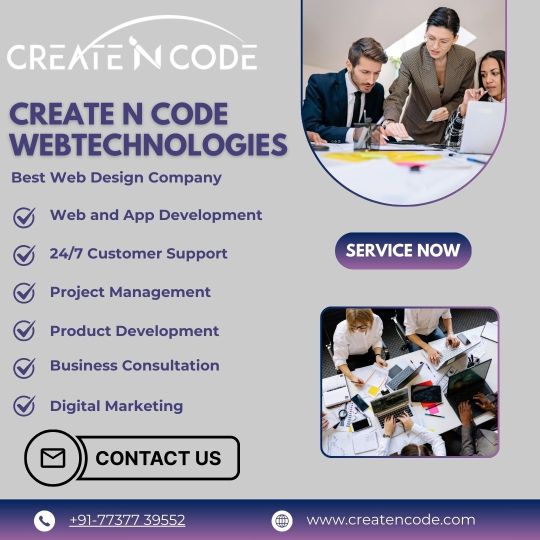
#website#website design#web design#seo services#digital marketing#web development#usa#usa news#india#web hosting#web developers
4 notes
·
View notes
Text
Unleashing the Power of Ecommerce Development Services

In the digital era, ecommerce has revolutionized the way businesses sell products and services, offering unparalleled opportunities for growth and expansion. A robust ecommerce website not only enhances customer reach but also boosts sales and improves brand visibility. Wartiz Technologies, a leader in ecommerce development services, leverages cutting-edge technologies and industry expertise to empower businesses with powerful ecommerce solutions. Let's explore how Wartiz Technologies unleashes the power of ecommerce development.
**1. ** Customized Ecommerce Solutions:
Wartiz Technologies begins by understanding the unique needs and goals of each client. They offer customized ecommerce development services tailored to specific business requirements, whether it's building a new online store from scratch or enhancing an existing ecommerce platform. By integrating advanced features and functionalities, they create scalable and flexible solutions that drive business growth.
**2. ** Responsive and User-Friendly Design:
With a focus on delivering exceptional user experiences, Wartiz Technologies prioritizes responsive design for ecommerce websites. They ensure seamless navigation and optimal performance across devices, including desktops, tablets, and smartphones. A user-friendly interface coupled with intuitive design elements enhances usability and encourages conversions, maximizing the effectiveness of ecommerce platforms.
**3. ** Ecommerce Platform Integration:
Wartiz Technologies integrates leading ecommerce platforms such as Shopify, WooCommerce, Magento, or develops custom solutions based on client preferences. They provide expertise in setting up product catalogs, managing inventory, processing payments securely, and optimizing checkout processes. Seamless integration of third-party plugins and APIs further enhances functionality and enhances the overall ecommerce experience.
**4. ** Search Engine Optimization (SEO) and Digital Marketing:
To increase online visibility and attract organic traffic, Wartiz Technologies incorporates SEO best practices into ecommerce development. They optimize product pages, implement strategic keyword targeting, and ensure fast page load times to improve search engine rankings. Additionally, they offer digital marketing services including PPC campaigns, social media marketing, and content strategy to drive targeted traffic and maximize ROI.
**5. ** Security and Payment Gateway Integration:
Ensuring the security of customer transactions is paramount in ecommerce. Wartiz Technologies implements robust security measures and integrates reliable payment gateways to safeguard sensitive information. They comply with industry standards such as PCI DSS to protect against fraud and provide customers with a secure and trustworthy shopping experience.
**6. ** Analytics and Performance Monitoring:
Continuous monitoring and analysis of ecommerce performance are essential for optimizing business outcomes. Wartiz Technologies sets up analytics tools to track key metrics such as sales performance, visitor behavior, and conversion rates. They provide actionable insights that enable businesses to make informed decisions and refine their ecommerce strategies for greater success.
**7. ** Support and Maintenance:
Beyond development, Wartiz Technologies offers ongoing support and maintenance services to ensure the smooth operation of ecommerce websites. They conduct regular updates, perform backups, and provide technical assistance to resolve issues promptly. Proactive maintenance helps prevent downtime and ensures uninterrupted online sales and customer support.
Conclusion
Wartiz Technologies excels in unleashing the power of ecommerce development services by combining technical expertise with a customer-centric approach. Whether you're a startup or an established enterprise, partnering with Wartiz Technologies can transform your ecommerce vision into reality, driving revenue growth and enhancing customer satisfaction. Their commitment to innovation and excellence makes them a trusted partner in navigating the complexities of ecommerce and achieving sustained success in the competitive digital marketplace.
If you're looking to harness the full potential of ecommerce for your business, consider collaborating with Wartiz Technologies to leverage their comprehensive ecommerce development services and propel your online presence to new heights.
#Online Marketing Services#Coustom Software Development Company#Mobile Application Development#Website Development Services#Digital Marketing Services#IT company Mohali
2 notes
·
View notes
Text
The iPaaS Empowerment and Some Essential Capabilities Fueling Success!
iPaaS (Integration Platform as a Service) has proved as a game-changer for businesses to grow & rule the current market with integration, accelerated workflows & enhanced data management solutions. It’s a cloud-based solution that helps in integrating software applications & streamlines operations. A professional iPaaS company can help you with enterprise-level solutions and offers a comprehensive approach that drives success for your organization. Many businesses, irrespective of their size & specification, are going to hire an iPaaS provider because it results more economical & beneficial for their businesses. But, before shifting it to a 3rd party service provider, there are certain factors that you must consider. In this blog, we have compressed some of the most crucial parameters that you must look into while connecting with an iPaaS provider.
Different considerable aspects while going for the iPaaS revolution
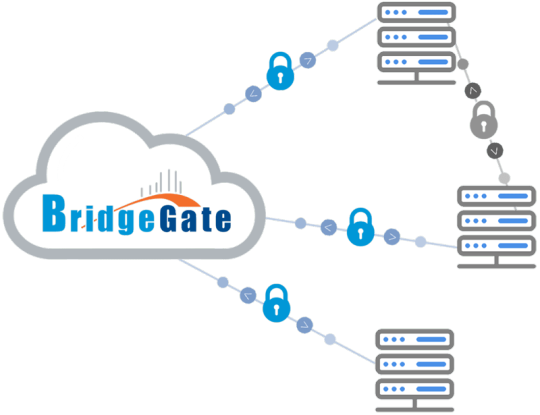
Optimized connectivity-
One of the prime qualities of an iPaaS company is to provide uninterrupted connectivity & effortless integration in the system. An iPaaS platform can create comprehensive compatibility & agility that not only connects the applications but also effortlessly integrates with legacy systems, cloud-based apps, APIs & IoT devices. This approach helps businesses a lot in unifying data from different sources, receiving proper data insights, taking data-driven decisions, and streamlining their operations.
Workflow automation-
iPaaS platform can help a business by creating complex workflows with ease through unparalleled workflow automation. It removes the need for human intervention and leads to fewer error occurrences, which are mainly human errors. It makes the process more fluent with a user-friendly interface & visually engaging appearances. Also, there are advanced triggers like real-time notification & supervision that result in optimizing the operations and eventually generating better results for the products & services.
AI-Powered insights-
In the age of data integration & data management solutions, AI has come up with a crucial role that helps in extracting valuable insights from the vast region of information. With advanced analytical tools & technologies, it helps in transforming raw data into actionable insights. This helps an organization identify opportunities & take data-driven decisions. Prescriptive analytics helps in creating customizable recommendations. Leveraging AI, iPaaS empowers companies to track performance, identify & monitor KPIs, and drive continuous improvement across all business functions.
Scalability-
The uninterrupted growth of a business highly relies on scalability & performance efficiency. An iPaaS platform provides advanced data management services by leveraging cloud-native architecture & trending data handling techniques. In this ever-increasing demand of the current business market, scaling capacities & performance assurance ensure the high-end success of a business. The iPaaS platform offers a quick response time & smooth data flow across the system by focusing on strategic implementations & breaking technological boundings effectively.
Data transformation & governance- iPaaS companies can help your business with effective data transformation & governance. To meet the standard regulatory aspects, functions like data encryption, strict data security & data governance are performed. iPaaS platform ensures that the right information is delivered in the right direction at the right time. From data mapping & transformation capabilities to data manipulation & governance, this platform can make it more seamless, holds customers' trust, and enables them to embrace the benefits of data-driven decisions.
Wrapping up
The above-mentioned parameters establish the credibility & expertise of a professional iPaaS company that can help businesses to optimize their digital transformation journey. Vorro’s BridgeGate Integration is an iPaaS that offers a collaborative solution approach to businesses across different industries and helps them to advance their ecosystem with trending technical interventions. As a responsible service provider, we use technology to provide scalable integration solutions by ensuring high-end security measures. If you are someone who is passionate about unlocking the enterprise's success of your business, embrace the power of iPaaS without compromising! We encourage you to welcome this digital revolution today to position your business at the forefront of the market tomorrow!
2 notes
·
View notes
Text
What is Composable Commerce?
Composable Commerce can be best described as a paradigm shift that empowers businesses to create and deliver seamless, personalized, and exceptional digital experiences for their customers. It is an approach that breaks free from the limitations of traditional monolithic commerce systems, opening doors to unparalleled flexibility, agility, and growth.
Introducing Composable Commerce
Composable Commerce can be defined as an innovative approach that empowers businesses to create tailored commerce solutions by assembling flexible, interchangeable components. Its key principles revolve around modularity, interoperability, and the ability to compose and recompose commerce functionalities based on specific business needs. It embraces a granular and decoupled architecture that enables businesses to achieve unprecedented flexibility and customization.
In contrast to traditional commerce systems, Composable Commerce stands out due to its modular and API-driven approach. Rather than being bound by rigid monolithic structures, Composable Commerce allows businesses to integrate best-of-breed components seamlessly. This freedom from vendor lock-in enables faster innovation, easier adaptation to market changes, and the ability to leverage specialized services and technologies.
Adopting a Composable Commerce approach brings forth numerous benefits for businesses:
Flexibility and agility: Composable Commerce enables quick adaptation to customer expectations and market demands through easy assembly and disassembly of components.
Scalability and customization: Businesses can scale specific components independently, optimizing resource allocation, and deliver personalized experiences with the modular nature of Composable Commerce.
Faster time to market: Streamlined development processes in Composable Commerce reduce time and effort for introducing new features, giving businesses a competitive edge.
Enhanced customer experience: Composable Commerce allows for seamless, personalized experiences across touchpoints, optimizing conversions and ensuring customer satisfaction.
Implementing Composable Commerce
Before diving into implementing Composable Commerce, it's crucial to assess your business needs and evaluate if it aligns with the principles and benefits of this approach. Understand your current commerce systems, pain points, and desired outcomes to determine if Composable Commerce is the right fit for your organization.
A well-thought-out plan and strategy are essential for a successful transition to Composable Commerce. Identify key stakeholders, set clear goals, and establish a roadmap for implementation. Consider factors such as resource allocation, timeline, and potential challenges, and outline a comprehensive strategy to guide the transition process.
Steps involved in implementing Composable Commerce
Identifying and selecting the right components
Integrating existing systems with Composable Commerce architecture
Testing and optimizing the system
Ensuring security and scalability
By following these steps, businesses can embark on a successful journey to implement Composable Commerce. Remember, careful planning, alignment with business needs, and a systematic approach are key to achieving a seamless transition and reaping the rewards of Composable Commerce.
2 notes
·
View notes
Text
Low-code Development Platforms: Build an app through Graphical User Interfaces

Amidst the growing demand for digital transformation across the businesses in all domains, building an application following the traditional mobile application development process becomes a bewildering challenge. Businesses want to integrate more digital transformation into the operational processes, and this calls upon the need to speed up application development by using advanced tools and technologies.
This calls upon the need to adopt low-code-development platforms for quick business transition and seamless growth. According to PS Intelligence in 2018, the global low-code development platform market was valued at 5.6 billion USD and is expected to reach 52.3 billion USD by 2024, progressing at a CAGR of 45.2% during the forecast period.
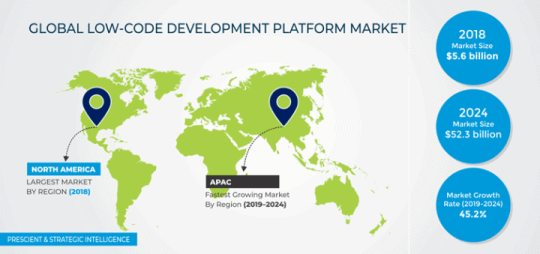
With these platforms, the web and mobile developers do not write long codes; instead, the entire application development process includes visual elements along with drag and drop actions.
What is low-code development?
Low-code development is an application development approach that accelerates the development process by infusing visual elements and eliminate the need for manual coding for faster delivery.
Features of Low-code development platforms
A low code development platform incorporates extensive features that make it a must-have platform for business organizations to stay ahead of the competition. These features include:
Visual scripting: You can create an application module or whole application in a drag and drop like interface where you don’t have to write a single line of code. As programming code is more visual, it needs less thinking to be understood.
Visual modeling: Allows converting business ideas into workflows with UI elements such as data models, notifications, events and more.
Data remodeling: Seamlessly converts data models into APIs and relational tables.
Mobility: Integrated with mobility mechanism that makes the application more responsive over mobile devices.
Security: Access management features give you full control over the application. You can manage who can view your application and when.
App life-cycle management: Low code development principles simplify deployment and maintenance while making the app more scalable.
Rules engine: Simplifies the process to define business logic through an in-built rule engine. Rule engine provides a development environment for coders to create applications through GUI and not actual programming code.
Hosting: Any rich user interface requirement can be settled by hosting custom code through the low development app platform.
Integration: Easy integration with third-party applications and systems via APIs and connectors.
Components of low-code development platform
Low code platform, also known as Rapid Application Development, allows both professional developers and non-developers like business managers or any IT professional who doesn’t know how to code but understands business logic to build and deploy web and mobile applications in few days or weeks. Few components of Low-code development platform include:
Continuous integration: The automated system picks up the latest version from the build, repository, test and validates the master file for deployment.
Reusability: Allows developers to switch from one project to another with ease, identify and resolve the problems efficiently while increasing the quality of the application portfolio.
Omnichannel app development: One code base for different devices enable developers to target problems right from one single platform.
Openness and extensibility: Using Cloud-based architecture, the developers can deploy applications quite easily and efficiently.
Performance: The integration of automated testing and quality monitoring makes these apps perform faster.
Connectivity: Empower users with extensive connectivity over IoT devices, Blockchain, Artificial Intelligence, and Machine Learning without the need to have expert knowledge.
Deployment: Public cloud integration offers scalability and reliability with a reduced need for maintaining the infrastructure.
youtube
What can you build with low code?
Internal applications: Low code allows creating beautiful, and advanced applications for the Business internal processes.
Customer-facing applications: Enables creating digital customer-focused and field focused applications with an immersive UI while incorporating easy accessibility and extensive usability.
Legacy modernization apps: Transform your CRM, ERP and other core business systems through low code development capabilities without impacting the regular business activities.
Operational efficiency apps: Low code application development helps to build apps that boost your business productivity to a remarkable extent.
Benefits of a low-code development platform
Low code application development is easy to use, integrate and deploy in the business infrastructure. Not only it is easy to build an app with the no-coding approach, but these apps are highly efficient and work on cross-platform devices. Some of the scalable features include:
Improved agility: Accelerate digital innovation and business transformation by building a responsive application using a quick to build approach.
Higher productivity: Lesser coding with automated testing, database handling, scaling, one-click deployment capabilities results in yielding higher productivity and better results.
Decreased cost: Low code application development doesn’t demand to deploy hardware components as its cloud-based and thus proves to be a cost-efficient app development approach.
Effective risk management and governance: Since everything is available on the cloud and can be managed from one interface, risk management becomes easier.
Faster transformation: With a low code development approach, the developers can build more apps in lesser time. Easy deployment and management results in faster business transformation.
Change easily: With drag and drop elements and simple visual components, it’s extremely easier to change the application at any point in time.
How low-code platforms are transforming software development?
Low code platforms integrate powerful features such as citizen development that enables users with even no technical knowledge to code the program. These single interface platforms are cloud-based and offer ease of usability that adds to transform software development.
5 best low-code development platforms in 2020
1) DWKit
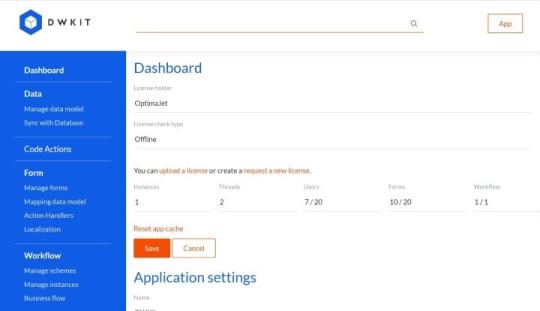
DWkit is an efficient low code development program packed with effective features. It is a form builder, security, workflow, and data mapping application.
Link: Web
2) Appian

The platform offers native AI services with zero-code integration to ML/AI platforms through Amazon AWS, Microsoft Azure and Google Cloud.
Link: Web
3) Visual LANSA

Visual LANSA is an effective and powerful platform for developing web, mobile, and desktop applications. It features extensive application testing, deployment, and integration tools.
Link: Web
4) KissFlow
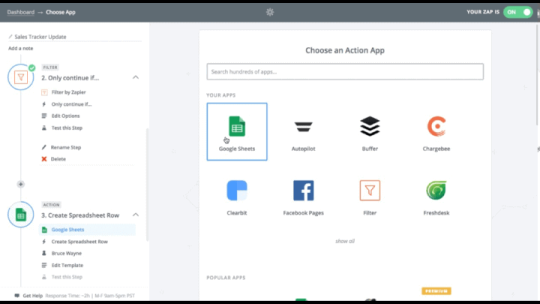
Eliminates the need to code your application completely with KissFlow. Drag and drop tools to build tasks and fields as well as to add and edit various fields.
Link: Web
5) Mendix
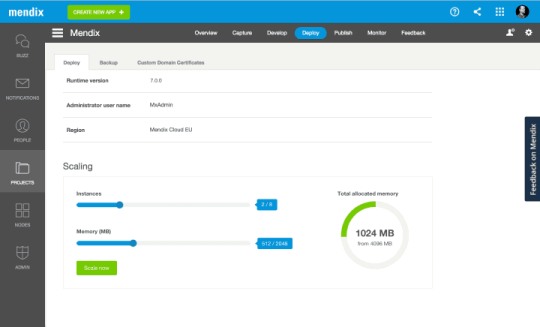
Integrates highly advanced visual modeling tools and reusable components. Agile project management capabilities make it more powerful.
Link: Web
How TechAhead can help you in low-code development?
If you are looking for a low code development platform for your business and don’t know where to get started, TechAhead is here to help you build enterprise-grade apps quickly and efficiently for complete business transformation.
Final words
Low code platforms allow developers to create mobile and web apps without coding using drag and drop options. These platforms are an efficient way for mobile app development companies to get more done in case of apps with limited functionality.
Frequently Asked Questions (FAQs)
What is the low-code development platform? Low code development is an application development platform that eliminates the need for heavy coding while building an app. It includes visual elements and drag and drop tools that enable building creative, powerful and responsive apps for businesses.
Does low code mean no-code? Low code development platforms include coding, but not as much as that of traditional application development approaches.
How do low code platforms facilitate digital transformation? Applications build using low code platforms help businesses cope up with the rising market demands and help them stay ahead of the competition.
How to identify a low code platform for enterprise-grade apps? A good low code development platform is one that includes capabilities such as:
Cognitive intelligence
Change management
Simple prototype development
Citizen development
Easy requirement gathering
Integration readiness
1 note
·
View note
Text
The Future of Android App Development: What Businesses Need to Know

In today’s mobile-first world, having a strong digital presence is no longer optional—it’s a necessity. Android app development has emerged as a game-changer, providing businesses with scalability, global reach, and unparalleled customization to engage customers effectively. Whether you are a startup, SME, or enterprise, investing in a well-crafted Android application can elevate your brand, improve user experience, and drive business growth.
At Sciflare Technologies, we specialize in custom Android app development services, helping businesses transform ideas into high-performance applications. But before you start developing an Android app, it’s essential to understand the key trends, technologies, and best practices shaping the industry.
Why Android App Development Matters for Businesses
Expanding Market Reach With over 3.5 billion active Android users worldwide, the Android platform offers an unmatched opportunity for businesses to reach a global audience. Android dominates the market share, making it the preferred choice for startups and enterprises looking to scale efficiently.
Cost-Effective Development Android provides a more budget-friendly development ecosystem compared to iOS. The availability of open-source tools, extensive documentation, and skilled developers makes it easier for businesses to build cost-effective apps without compromising quality.
Customization & Flexibility Android’s open-source nature allows high-level customization, making it possible to tailor apps based on business needs, industry requirements, and customer behavior. Whether you need a simple eCommerce app or a complex enterprise solution, Android offers the flexibility to build it.
Key Trends in Android App Development
AI & Machine Learning Integration From chatbots to predictive analytics, AI is reshaping how businesses interact with users. Apps powered by machine learning enhance user experience by automating tasks, personalizing content, and improving decision-making.
5G Technology Adoption The rollout of 5G networks is transforming mobile app performance, offering faster speeds, lower latency, and improved connectivity—a game-changer for businesses relying on real-time applications, AR/VR, and IoT solutions.
Kotlin Becoming the Preferred Language Google has officially endorsed Kotlin as the primary language for Android development. With its concise syntax, improved performance, and reduced runtime errors, Kotlin is rapidly replacing Java as the go-to choice for developers.
Cloud-Based Mobile Apps Cloud integration is enabling seamless synchronization of data across devices, making apps more lightweight, scalable, and accessible. Businesses can reduce infrastructure costs and improve performance using cloud-driven applications.
Rise of Progressive Web Apps (PWAs) PWAs are web-based applications that deliver an app-like experience without requiring downloads from an app store. Businesses looking to offer fast-loading, offline-accessible solutions are increasingly opting for PWAs.
Best Practices for Android App Development
Focus on User Experience (UX) & Interface (UI) A visually appealing app isn’t enough—seamless navigation, intuitive design, and user-friendly interfaces are key to keeping users engaged. Investing in UI/UX design ensures higher user retention and conversion rates.
Optimize Performance & Speed Slow-loading apps result in high bounce rates and poor reviews. Optimizing code, compressing media files, and implementing caching mechanisms can significantly enhance app performance.
Implement Robust Security Measures With increasing cyber threats, security is a priority. Using secure APIs, encrypted databases, and two-factor authentication (2FA) helps in protecting user data and building customer trust.
Test Across Multiple Devices Android apps must work seamlessly across various devices and screen sizes. Automated testing tools such as Espresso, Firebase Test Lab, and Appium help in identifying bugs early and ensuring compatibility.
How Sciflare Technologies Can Help You Build a Powerful Android App At Sciflare Technologies, we offer end-to-end Android app development services tailored to your business needs. Our expert team ensures:
✅ Custom App Development – Scalable, feature-rich, and user-friendly apps. ✅ Kotlin & Java Expertise – Modern, high-performance, and bug-free development. ✅ UI/UX-Optimized Design – Engaging and intuitive user experiences. ✅ Agile Development Process – Fast, efficient, and cost-effective solutions. ✅ Post-Launch Support – Ongoing maintenance, security updates, and performance optimization.
We work closely with businesses across industries—eCommerce, healthcare, finance, logistics, and more—to create high-performance Android applications that drive growth and innovation.
Final Thoughts Investing in Android app development is a strategic move for businesses looking to scale and engage customers effectively. With the right technology, design, and development approach, you can build an app that stands out in the competitive market.
If you’re looking for a reliable Android app development company, Sciflare Technologies is here to help. Our team of skilled Android developers is ready to bring your vision to life.
🚀 Let’s Build Something Amazing! 📩 Get a Free Consultation Today: Sciflare Technologies
0 notes
Text
Best Web Development Solutions to Elevate Your Online Presence
The Role of Web Development in Digital Marketing Success.
Introduction
In today’s digital era, a strong online presence is crucial for businesses, startups, and individuals. A well-designed and fully functional website enhances user engagement, builds credibility, and drives business growth. Web development is the process of designing, building, and maintaining websites, ensuring they are responsive, fast, and user-friendly.
What is Web Development?
Web development refers to the process of creating and maintaining websites and web applications. It involves coding, designing, testing, and deploying websites that meet business and user needs.
Types of Web Development
There are three main types of web development:
1. Front-End Development
Focuses on the user interface (UI) and experience (UX).
Uses technologies like HTML, CSS, JavaScript, React, Angular, and Vue.js.
Ensures responsiveness and compatibility across devices.
2. Back-End Development
Manages the server-side logic, databases, and APIs.
Uses languages like PHP, Python, Ruby, Node.js, and Java.
Ensures website security, performance, and functionality.
3. Full-Stack Development
Involves both front-end and back-end development.
Developers handle the entire web application process.
Uses frameworks like MEAN (MongoDB, Express.js, Angular, Node.js) and MERN (MongoDB, Express.js, React, Node.js).
Key Stages of Web Development
1. Planning & Research
Define website goals and target audience.
Conduct market research to understand competitors and trends.
Plan website structure, features, and functionalities.
2. Design & Prototyping
Create wireframes and UI/UX mockups.
Develop a prototype for user testing and feedback.
3. Development
Front-End Development: Building a visually appealing and responsive interface.
Back-End Development: Ensuring smooth functionality and database integration.
Implement security measures and performance optimization.
4. Testing
Conduct functional, performance, and security testing.
Identify and fix bugs to ensure smooth performance.
5. Deployment & Launch
Host the website on a server or cloud platform.
Optimize for SEO and mobile responsiveness.
Implement a marketing strategy for website visibility.
6. Maintenance & Updates
Regularly update content and security features.
Monitor website performance and user feedback.
Optimize speed and fix any issues.
Best Practices for Web Development
✔ Ensure mobile responsiveness and fast loading speed. ✔ Use clean and efficient code for better performance. ✔ Implement strong security features to prevent cyber threats. ✔ Optimize for SEO to improve search engine rankings. ✔ Focus on user-friendly UI/UX design. ✔ Regularly update and maintain the website.
Conclusion
Web development is a constantly evolving field that requires technical expertise, creativity, and attention to detail. Whether you're a beginner or an experienced developer, following best practices and keeping up with the latest trends will help you create high-quality, functional, and engaging websites.
Would you like me to add coding examples, tools, or frameworks to enhance the guide? 🚀
0 notes
Text
Navigating the Future of GRC and Access Governance in SAP Ecosystems
A New Era of Security and Access Governance
Governance, Risk, and Compliance (GRC) and Access Governance are undergoing major changes due to digital growth and stricter regulations. As organizations connect more data and systems, they’re shifting from isolated security practices to proactive, integrated compliance processes. Raghu Boddu, founder of ToggleNow and a seasoned leader in SAP GRC, has observed these shifts closely.
“Fifteen years ago, most companies didn’t treat security as a separate function—it was part of Basis administration,” Raghu explains. “Today, security is essential, and organizations know it’s crucial for protecting data, compliance, and brand reputation.”
New Market Realities and Demand for Integrated GRC Solutions
SAP has long been at the forefront of GRC, offering tools to help both finance and IT teams tackle compliance challenges. Solutions like SAP Access Control and Identity Access Governance (IAG) provide the flexibility to manage today’s security needs while adapting to future ones. As businesses adopt hybrid and multi-cloud systems, managing security across different platforms has become more complex. This is where SAP’s Business Technology Platform (BTP) shines. BTP connects SAP and non-SAP applications seamlessly, creating a secure, compliant ecosystem. “BTP and SAP Identity Services have changed the game for multi-cloud environments,” says Raghu. “Today, integration is nearly seamless thanks to SAP’s open APIs and connectors. This has allowed companies to manage security across hybrid systems without needing extensive customization.”
Regional Insights: GRC Maturity and Market Growth
The GRC and Identity Access Management (IAM) markets vary widely across regions, shaped by local regulations and market maturity. In the U.S., SoX compliance has driven strict GRC standards for years. Many American companies have developed sophisticated GRC processes, particularly around data security and financial compliance. Meanwhile, regions like India are rapidly catching up.
“The growth potential in India is huge,” Raghu shares. “Over the last five years, Indian businesses have started treating GRC as essential, not optional.”
In both the U.S. and other markets, companies are increasingly adopting automation and hybrid identity solutions to handle complex regulations. This shift reflects a global move toward integrated compliance, with GRC becoming a core business priority rather than a “tick-the-box” function. As Raghu adds, “It’s inspiring to see GRC prioritized as part of strategy, not just an audit requirement.”
The Future of GRC: AI-Driven Compliance and Embedded Solutions
a) AI and Automation in GRC
Automation and AI are quickly transforming GRC from a reactive function into a proactive one, identifying risks before they become problems. With AI-driven GRC, systems can automatically analyze data to help companies detect potential compliance issues and manage risk more intelligently. SAP’s GRC tools with AI simplify compliance processes and improve decision-making, allowing teams to focus on strategic priorities.
Raghu highlights the potential of AI in GRC: “AI has incredible potential in the GRC space. It’s about giving businesses more power to manage risk with accuracy, while reducing manual efforts and errors.”
b) Embedding Compliance into Daily Processes
Looking forward, GRC will be embedded directly within applications and workflows, constantly monitoring for risks and responding to threats as they arise. Raghu envisions this future: “In the next five years, GRC as a standalone system may fade. Instead, it will be part of daily workflows, where applications flag risks and suggest controls in real time. AI will automate many compliance tasks, cutting down manual efforts.”
He adds, “Imagine GRC as a tool that proactively flags a potential access issue based on historical patterns—like a security recommendation engine. This proactive risk management approach is where AI will make the most impact.”
About Raghu Boddu and ToggleNow: Innovating in GRC and SAP Integration
Raghu Boddu, founder of ToggleNow, has over two decades of experience in SAP GRC and has witnessed the industry’s evolution firsthand. He started ToggleNow to address complex GRC challenges, helping companies make compliance efficient and accessible. With solutions that streamline risk management and improve security, ToggleNow has become a trusted partner for organizations operating in SAP environments.
Raghu is also a published author, with books such as SAP Access Control 12.0 Comprehensive Guide, SAP Process Control 12.0 Comprehensive Guide, and SAP Cloud IAG eBite. The books offer practical insights into implementing SAP GRC solutions effectively. His books emphasize not only the technical aspects but also strategic best practices, making them valuable resources for GRC professionals.
ToggleNow has been particularly impactful in areas like SAP integration and GRC automation, where Raghu’s team develops innovative tools that simplify complex processes. “At ToggleNow, our focus is to help clients build a compliant, adaptable GRC framework that meets today’s demands while preparing for tomorrow’s,” says Raghu.
Read more: https://togglenow.com/blog/navigating-the-future-of-grc-and-access-governance-in-sap-ecosystems/
#sap role design best practices
#sap security role design best practices
#sap security role design document
#role design in sap security
#sap role redesign
#sap role design
#sap security role redesigning
#redesign of sap authorizations
#sap security role design best practices#sap authorization review#sap role design#sap sod conflicts#sap security role design document#sap authorization
0 notes
Text
BUIDL: The Ultimate DeFi Solution with Auto-Staking & High APY

Revolutionizing Passive Income in Crypto
The DeFi space is filled with opportunities, but few projects offer a truly sustainable and rewarding experience. Many staking platforms require constant management, confusing processes, and unreliable returns. BUIDL is here to change that!
With the innovative BUIDL Autostaking Protocol (BAP), investors can enjoy a fixed APY of 526.5%, rebasing rewards every 60 minutes, and an effortless buy-hold-earn mechanism that grows your portfolio automatically. No staking, no manual reinvestment—just passive income flowing directly into your wallet!
Why BUIDL Stands Out in DeFi
BUIDL isn't just another DeFi token—it’s an ecosystem built for long-term success, sustainability, and maximum investor rewards. Here’s why BUIDL is the next big thing in crypto:
Auto-Staking & Auto-Compounding – Earn rewards every 60 minutes without lifting a finger.
Sustainable Fixed APY – A guaranteed high return of 526.5% APY.
BUIDL Insurance Fund (BIF) – Protection from extreme market volatility.
Risk-Free Value (RFV) Fund – Ensures long-term staking sustainability.
Deflationary Burn Mechanism – Reducing token supply over time, increasing value.
BUIDL: The Highest Fixed APY in DeFi

How Much Can You Earn?
BUIDL is designed to maximize passive income while ensuring stability. Here’s an estimated earnings breakdown:
Initial Investment: $1,000 worth of BUIDL
APY: 526.5%
Potential Returns in 1 Year: $6,265.01
(Assumes RFV sustains rebase rewards for 365 days.)
BUIDL Tokenomics: A Sustainable Model
BUIDL operates on BEP-20 (Binance Smart Chain), offering seamless transactions and automatic rewards via positive rebasing.
Token Distribution & Supply
Initial Supply: 21,000 BUIDL
Max Supply: 21,000,000 BUIDL
Team Tokens: None
Buy & Sell Taxes

Fund Allocation

How BUIDL Works: The Future of Passive Income
1. Auto-Staking & Auto-Compounding
No manual staking required! Simply hold BUIDL, and your balance increases every 60 minutes, 24 times a day.
2. Risk-Free Value (RFV) Protection
A percentage of transaction fees (5% buy / 6% sell) funds the RFV, ensuring that rebase rewards are sustainable.
3. Automated Liquidity Pool (LP) Growth
5% of trading fees go directly to liquidity, maintaining price stability.
4. Deflationary Burn Mechanism
1% of every transaction is automatically burned, reducing supply and increasing token value.
5. BUIDL Insurance Fund (BIF)
A portion of each transaction (2% buy / 3% sell) funds the BIF, shielding investors from flash crashes.

BUIDL Presale
The BUIDL presale is a limited-time opportunity for early investors to acquire tokens at a competitive rate before the official market launch. Here’s a breakdown of the presale details:
🔹 Total BNB Raised: 304.76 BNB
This amount represents the total funds contributed by early investors, demonstrating strong community trust and demand for BUIDL.
🔹 Presale Tokens: 8,400 BUIDL
A total of 8,400 BUIDL tokens have been allocated for the presale, ensuring that early supporters receive a fair share before public trading begins.
🔹 Bonus Tokens: 840 BUIDL
Investors participating in the presale will receive an extra 10% bonus in BUIDL tokens, incentivizing early adoption and increasing potential returns.
🔹 Affiliate Bonus: 10% (1 Level)
To encourage referrals and community-driven growth, BUIDL offers a 10% affiliate bonus for every successful referral, allowing investors to earn additional rewards.
🔹 Presale Start Time: January 24, 2025, at 14:00 UTC
This marks the official launch of the exclusive presale period, providing early investors the first chance to acquire BUIDL tokens.
🔹 Presale End Time: February 15, 2025, at 14:00 UTC
The presale will conclude on this date, after which unsold tokens will be burned to reduce supply and enhance token value.
🚀 By participating in the BUIDL presale, investors can secure tokens at an early stage and maximize their earning potential before the project gains mainstream traction.
Presale Benefits
No Deposit Limits – Invest as much as you want.
Multiple Deposits Allowed – Contribute multiple times.
Final Price Determined by Smart Contract – Based on total BNB deposited.
Liquidity Added to PancakeSwap – Ensuring smooth trading post-launch.
Unclaimed Tokens Burned – Increasing scarcity and potential value.
Final BUIDL Price Formula
BNB Deposited / BUIDL Presale Tokens = BUIDL Price
Once the presale ends, liquidity will be added to PancakeSwap within 30 minutes, setting the initial market price.
Key Takeaways: Why You Should Invest in BUIDL
BUIDL is redefining decentralized finance with its innovative BUIDL Autostaking Protocol (BAP), offering one of the highest fixed APYs in the industry. Here’s why investors are flocking to this game-changing project:
✅ Industry-Leading APY – 526.5% Passive Income
BUIDL delivers a sustainable and fixed annual percentage yield, ensuring high rewards for long-term investors.
✅ Automated Earnings – No Manual Staking, Just Hold & Earn
Forget complicated staking platforms—simply hold BUIDL tokens in your wallet, and the system automatically rewards you every 60 minutes.
✅ Security & Stability – Protected by RFV & BIF
BUIDL incorporates Risk-Free Value (RFV) and the BUIDL Insurance Fund (BIF) to stabilize earnings and mitigate risks from market volatility.
✅ Auto-Compounding Every 60 Minutes – Maximum Growth Potential
BUIDL’s protocol automatically compounds rewards 24 times a day, ensuring that your holdings grow exponentially.
✅ Deflationary Burn Mechanism – Increasing Token Scarcity & Value
A portion of each transaction is burned, reducing supply and helping to increase the value of remaining tokens over time.
✅ Community-Driven Governance – Investors Shape BUIDL’s Future
Holders play a vital role in decision-making, ensuring that the ecosystem evolves based on community interests.
🚀 BUIDL is more than just another staking token—it’s a powerful, automated investment tool built for long-term growth. Ready to start earning? Join the BUIDL revolution today!
Join the BUIDL Revolution!
🚀 Don’t miss out! Secure your BUIDL tokens now and start earning passive income effortlessly!
Link Information:
Wibesite: https://buidl.build/ Whitepaper: https://buidl-token.gitbook.io/ PitchDeck: https://buidl.build/buidl%20ENG.pdf Telegram: https://t.me/buidlbsc Twitter: https://x.com/buidlbsc Buy On PancakeSwap: https://pancakeswap.finance/?outputCurrency=0x4a67a307e6c6f35117ecfdd4a2767095eb4c2b4e PooCoin Chart: https://poocoin.app/tokens/0x4a67a307e6c6f35117ecfdd4a2767095eb4c2b4e DexTool Chart: https://www.dextools.io/app/en/bnb/pair-explorer/0x62bcdc4f6297fbcadbe755005cf6bc674add0f71 Audit Report: https://app.solidproof.io/projects/buidl
Proof of Authentication
Bitcointalk username: woez Bitcointalk profile url: https://bitcointalk.org/index.php?action=profile;u=2390454 Telegram username: @Zidanie BSC address: 0xB12a44A8d6F9Ca89cf746120A4e64FdB61b56aCB
0 notes
Text
Legacy Modernization Services: Transforming Insurance for the Digital Age
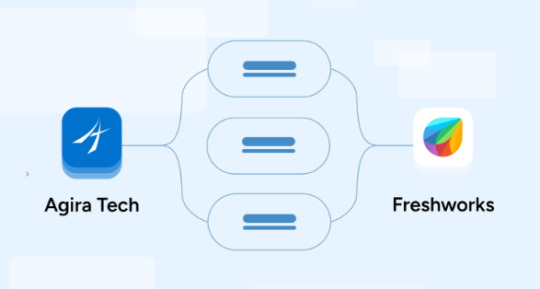
The insurance industry is undergoing a massive digital transformation, yet many insurers continue to rely on legacy systems that are outdated, inefficient, and costly to maintain. These aging systems hinder scalability, security, and customer experience, making it difficult for insurers to stay competitive in today’s fast-paced market.
Legacy modernization services provide a strategic approach to upgrading these systems, ensuring seamless integration with digital technologies, enhanced operational efficiency, and compliance with evolving regulations. AgiraSure’s Legacy Modernization Services enable insurers to transition from outdated IT infrastructures to agile, cloud-based, and AI-driven solutions that drive business growth.
Why Insurance Companies Need Legacy Modernization Services
Legacy systems were once the backbone of insurance operations, but they now pose several challenges:
High Maintenance Costs – Older systems require expensive upkeep and manual interventions.
Limited Scalability – Legacy infrastructures struggle to support new digital capabilities.
Security Vulnerabilities – Outdated software is prone to cyber threats and compliance risks.
Inefficient Processes – Manual workflows slow down claims processing, underwriting, and policy management.
Integration Challenges – Legacy systems lack flexibility for AI, automation, and data analytics integration.
Modernizing these systems is essential for improving efficiency, enhancing customer experience, and staying ahead in a rapidly evolving insurance landscape.
Key Legacy Modernization Services for Insurers
1. Cloud Migration & Infrastructure Modernization
Moving from on-premise systems to cloud-based infrastructure is a core aspect of legacy modernization. Cloud transformation ensures:
Scalability – Expand resources based on business needs.
Cost Efficiency – Reduce IT expenses by eliminating on-premise maintenance.
Data Security & Compliance – Cloud providers ensure robust security measures and regulatory adherence.
2. API-Driven Integration & System Interoperability
Legacy systems often lack connectivity with modern platforms. API-driven integration enables insurers to:
Seamlessly connect old systems with new technologies.
Enable real-time data sharing across applications.
Enhance automation, improving claims and policy management.
3. AI-Powered Automation for Process Optimization
AI and automation streamline insurance workflows, reducing manual effort and increasing efficiency. Modernization enables:
AI-driven underwriting and risk assessment.
Chatbot-powered customer interactions for instant policy support.
Automated claims processing for faster settlements.
4. Microservices & Modular Architecture Implementation
Rather than overhauling entire systems, AgiraSure enables insurers to transition to microservices architectures that:
Break down monolithic applications into modular services.
Enhance agility, allowing faster feature deployment.
Improve system reliability and scalability.
5. Data Modernization & Real-Time Analytics
Legacy systems often store data in unstructured and siloed formats. Modernization services provide:
Advanced data warehousing for structured insights.
Predictive analytics for fraud detection and customer behavior analysis.
AI-driven risk modeling for underwriting optimization.
6. Mainframe Modernization & Core System Upgrades
For insurers still using mainframe-based core systems, modernization strategies include:
Re-platforming applications to cloud environments.
Re-hosting existing software on hybrid infrastructures.
Re-engineering processes to support real-time transactions.
Benefits of Legacy Modernization for Insurance Companies
1. Improved Operational Efficiency
By automating processes and reducing manual interventions, insurers can accelerate policy issuance, claims processing, and customer interactions.
2. Reduced IT Maintenance Costs
Legacy system upgrades eliminate high maintenance expenses, replacing outdated infrastructures with cost-effective cloud solutions.
3. Enhanced Customer Experience
Digital self-service portals, AI-powered chatbots, and real-time policy updates improve customer engagement and satisfaction.
4. Strengthened Cybersecurity & Compliance
Modernized systems enhance data security, encryption, and compliance with industry regulations such as GDPR, HIPAA, and NAIC standards.
5. Faster Time-to-Market for New Products
Cloud-native, AI-driven platforms allow insurers to develop and launch new insurance products faster, adapting to changing market demands.
6. Competitive Advantage in the Digital Era
Legacy modernization positions insurers as innovative market leaders, ensuring long-term business sustainability.
Industries Benefiting from Legacy Modernization Services
1. Life & Health Insurance
AI-powered automated underwriting and policy approvals.
Cloud-based digital health records and policyholder management.
Predictive analytics for personalized insurance offerings.
2. Property & Casualty Insurance
Real-time risk assessment using IoT and AI-driven analytics.
Blockchain-powered claims processing for faster and fraud-proof settlements.
Digital portals for seamless policy renewals and updates.
3. Auto Insurance
Telematics-driven usage-based insurance models.
AI-powered accident detection and automated claims approvals.
Cloud-based integration of driver behavior analytics.
4. Reinsurance & Risk Management
Cloud-based platforms for automated risk modeling.
AI-powered insights for portfolio risk optimization.
Blockchain-driven smart contract execution for reinsurance agreements.
Steps to Implement a Successful Legacy Modernization Strategy
1. Assess Current Legacy Systems
Identify outdated components, inefficiencies, and integration challenges.
2. Define Business Goals & Modernization Priorities
Align modernization with operational efficiency, regulatory compliance, and customer experience goals.
3. Choose the Right Modernization Approach
Select the best approach based on business needs:
Rehosting – Migrating applications to cloud infrastructure.
Replatforming – Modifying applications for cloud compatibility.
Rearchitecting – Redesigning systems for enhanced scalability and security.
4. Implement in Phases & Minimize Downtime
Modernization should occur in phases to prevent disruptions in ongoing operations.
5. Train Employees & Optimize Workflows
Adopting new technologies requires training teams and optimizing workflows for efficient implementation.
6. Monitor, Evaluate & Optimize Continuously
Post-modernization, insurers must track system performance and make iterative improvements to maximize ROI.
Future Trends in Legacy Modernization for Insurance
AI-Powered Insurtech Solutions – Enhancing risk assessment, fraud detection, and claims automation.
Blockchain for Smart Contracts – Enabling instant, transparent insurance transactions.
Edge Computing for Real-Time Data Processing – Reducing latency in policy management and claims approvals.
Quantum Computing in Risk Modeling – Improving complex risk analysis and predictive insights.
Conclusion
Legacy modernization services are essential for insurance companies looking to enhance operational efficiency, security, and customer engagement. AgiraSure’s expertise in cloud transformation, AI-driven automation, and API integration enables insurers to transition seamlessly into the digital-first era.
By adopting AgiraSure’s Legacy Modernization Services, insurance companies can reduce costs, improve agility, and future-proof their operations, ensuring sustainable growth and competitiveness in the evolving insurtech landscape.
0 notes
Text
"Looking for the best app developers in Gandhinagar? Here are the top companies driving innovation in mobile app development! #AppDevelopment #Tech #Gandhinagar"
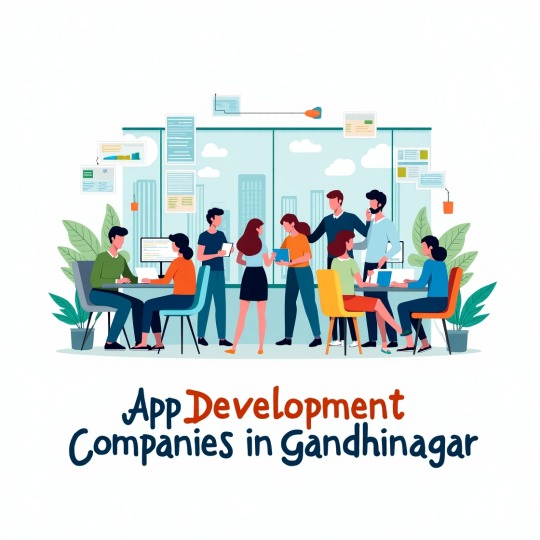
Introduction
In the rapidly evolving digital landscape, mobile applications have become a necessity for businesses looking to expand their reach and improve user engagement. As one of Gujarat’s major tech hubs, Gandhinagar is home to several Top App Development Companies offering innovative and customized mobile solutions. These companies specialize in developing high-quality Android, iOS and cross-platform applications that cater to various industries, ensuring businesses stay ahead in the competitive market.
If you are searching for the Best App Development Companies in Gandhinagar, this article provides a comprehensive list of top-rated firms known for their expertise, customer satisfaction and commitment to delivering exceptional mobile applications.
1. Talentrise Technokrate
Talentrise Technokrate is a leading App Development Company in Gandhinagar, offering cutting-edge mobile application solutions for startups and enterprises.
Services Offered:
Custom Android and iOS app development
Cross-platform mobile solutions
UI/UX design and prototyping
App maintenance and support
Why Choose AppWeb Solutions?
Expert developers with extensive experience
Focus on user-centric design
Seamless integration with business needs
2. Gandhinagar Tech Labs
Specializing in innovative mobile app solutions, Gandhinagar Tech Labs delivers feature-rich applications that enhance user engagement and business growth.
Services Offered:
Native and hybrid app development
AI-powered mobile applications
E-commerce and business apps
App security and optimization
Why Choose Gandhinagar Tech Labs?
Expertise in AI and machine learning integration
Scalable and secure app development
Affordable and timely project delivery
3. SoftInfotech Solutions
With a reputation for delivering high-performance mobile applications, SoftInfotech Solutions is a go-to choice for businesses in Gandhinagar.
Services Offered:
Android and iOS app development
API development and third-party integrations
Cloud-based mobile solutions
App store optimization (ASO)
Why Choose SoftInfotech Solutions?
Strong focus on app security and performance
Custom solutions tailored to business needs
High client satisfaction rate
4. NexGen Apps
NexGen Apps is a trusted name in Mobile Application Development, providing innovative and scalable app solutions across various industries.
Services Offered:
Enterprise mobile solutions
IoT and wearable app development
Progressive web applications (PWAs)
App testing and quality assurance
Why Choose NexGen Apps?
Expertise in next-gen mobile technologies
Agile development approach
Strong post-launch support and maintenance
5. FutureSoft Technologies
FutureSoft Technologies excels in developing high-quality mobile applications that align with the latest industry trends and business goals.
Services Offered:
Custom mobile application development
Mobile UI/UX design
Cloud-based mobile solutions
AI and chatbot integrations
Why Choose FutureSoft Technologies?
Innovative and scalable mobile solutions
Experienced development team
Strong focus on user experience and design
Conclusion
Selecting the right Mobile App Development Company is crucial for business success. The companies listed above are among the Top App Development Firms in Gandhinagar, known for their innovative solutions, technical expertise and client-focused approach. Whether you need an Android App an IOS solution or a cross-platform application, these companies can help you create high-quality mobile applications tailored to your business needs.
By partnering with a Top App Development Company in Gandhinagar, businesses can enhance their digital presence, improve customer engagement and drive long-term growth. Investing in Mobile App Development ensures you stay ahead in the competitive market while delivering exceptional user experiences.
0 notes